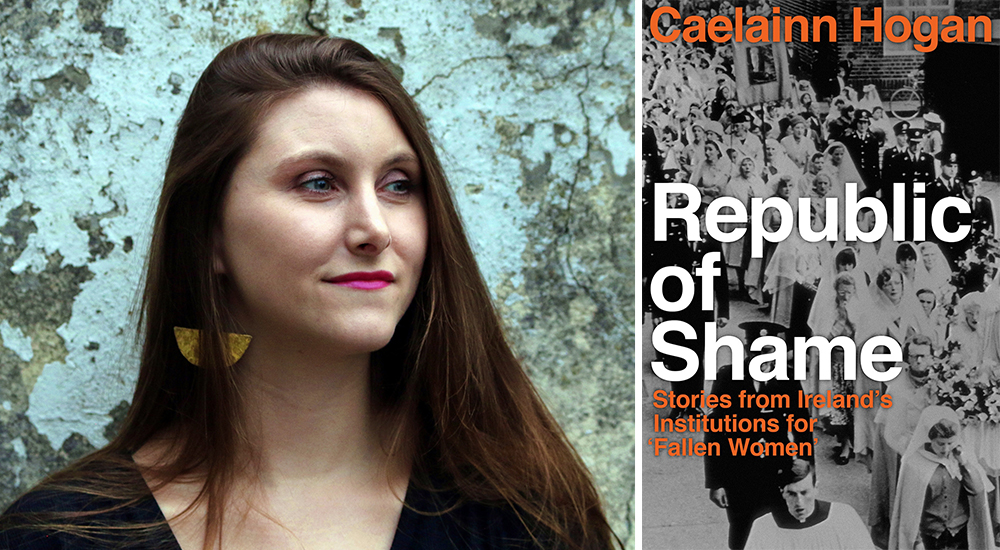Republic of Shame is the debut novel of an incredibly talented voice in Irish journalism, Caelainn Hogan who navigates the traumatic stories of the survivors with skill and sensitivity.
Until alarmingly recently, the Catholic Church, acting in concert with the Irish state, operated a network of institutions for the concealment, punishment and exploitation of ‘fallen women’.
In the Magdalene laundries, girls and women were incarcerated and condemned to servitude. And in the mother-and-baby homes, women who had become pregnant out of wedlock were hidden from view, and in most cases their babies were adopted – sometimes illegally.
Hogan begins our chat explaining how the fight for marriage equality set the stage for a national reckoning with our church & state sponsored oppression of women and children:
“The marriage equality referendum brought up a very painful debate around families, and who gets to be a family, there was a strong reaction to the suggestion that a family had to be, you know, a married man or woman, and anything outside of the traditional sense of the institution of the family, in some way wasn’t valid. I think that’s an issue that directly relates to these institutions and how unmarried mothers were made to feel.”
The Irish state has commissioned investigations in the aftermath of the discovery of a mass infant grave at the mother-and-baby home at Tuam. A scandal that rocked Ireland and made headlines worldwide in 2014.
Hogan started reporting on the homes and the legacy of that scandal in 2017 on the eve of the papal visit and a second referendum, to Repeal the 8th Amendment.
“Noelle Brown, an actor and playwright, wore lemon Converse and pushed back strands of her short, bright blonde hair as she spoke. Despite the marriage referendum and the recent repeal of the constitutonal abortion ban, it wouldn’t be a ‘new’ Ireland, she warned, until the country faced up to it’s past: ‘I get angry when people say, “But we never knew!” Everybody knew.; “ – Extract from Republic of Shame
The book explores the complex and callous collusion of Church and State in running these institutions, creating a shame-industrial complex and the far reaching consequences for people still searching for answers today.
Hogan explains: “A system that was exploiting people and, and repressing people, a repressive system, in the same way that colonization was seen as a civilizing mission or a beneficial, you know, benevolent system. It was important to realise that this was a system of institutions, very interconnected institutions.
It was gutting to contemplate the scale and ordinariness of the things she had been denied.
“The mother and baby homes, laundries, industrial schools are all interconnected and I really see a parallel with that, between that idea of the civilizing mission. It was a system that separated women from their children, that treated them as offenders that punished them for becoming pregnant.
“You literally see this language used in church and state documents, ‘offenders’ and it was a way of maintaining the influence and the authority of the church, it was a way for the state to abdicate its responsibility to people who needed support.”
The most gut-wrenching parts of Republic of Shame are the testimonies of survivors, children and indeed women still institutionalised, like Mary Gaffney, who now lives in one of the former Magdalene Laundries, Peacock Lane in Cork, which since 2017, is being run as a nursing home by the HSE. Mary was born in a Dublin Mother and baby home, barred by the nuns from ever knowing her mother and spent her whole life institutionalised.
“At one point, Mary asked me if I’d always worn my hair long. I told her it grows quickly. She said she always wanted long hair, but she was never allowed. I felt embarrassed about my long hair, when she could never have it; about showing her photos of my family’s dogs, when she, a dog lover, never had a pet; and for mentioning my mother as we chatted. It was gutting to contemplate the scale and ordinariness of the things she had been denied.” – Extract from Republic of Shame
Hogan concludes our chat with a rallying cry to try to undo some of the damage caused by the shame-industrial complex.
“We have to listen to survivors, we have to listen to women who experienced those institutions. We must recognise the fact that the state still bars adopted people from their information and we must address, the attempt to seal the records of the Commission for 75 years. So it’s perpetuating an ongoing system, a culture of secrecy, and continuing to silence the experiences of survivors, I think we need to reckon with this now.”
Republic of Shame by Caelainn Hogan is published by Penguin Ireland, and is out now in all good book stores and online here.
© 2019 GCN (Gay Community News). All rights reserved.
Support GCN
GCN is a free, vital resource for Ireland’s LGBTQ+ community since 1988.
GCN is a trading name of National LGBT Federation CLG, a registered charity - Charity Number: 20034580.
GCN relies on the generous support of the community and allies to sustain the crucial work that we do. Producing GCN is costly, and, in an industry which has been hugely impacted by rising costs, we need your support to help sustain and grow this vital resource.
Supporting GCN for as little as €1.99 per month will help us continue our work as Ireland’s free, independent LGBTQ+ media.

comments. Please sign in to comment.